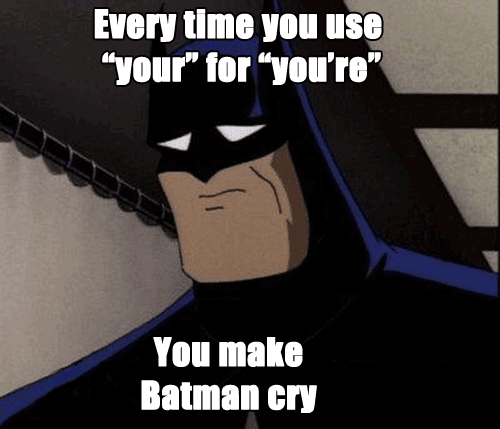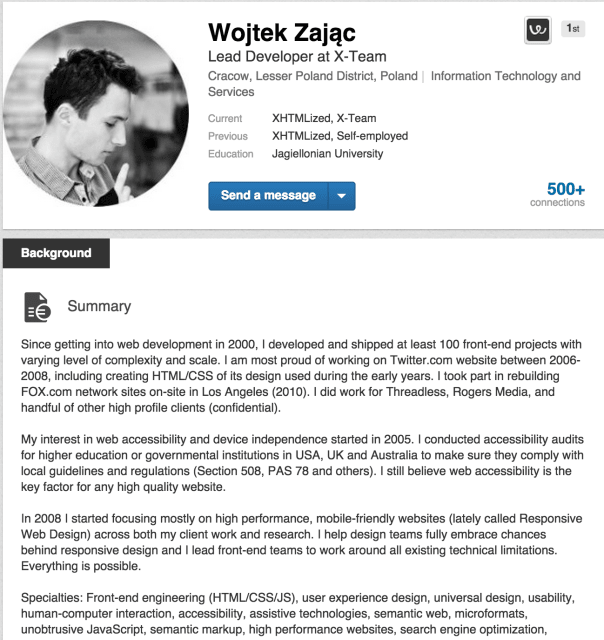If you’ve ever applied to work as a remote developer before, you may have wondered why you never heard anything in response.
X-Team has a thorough vetting process we go through with each developer we meet, but most developers never make it past a simple 1-minute screening of their online presence.
We can very quickly tell if someone is ready to be an effective remote developer, as a leader, communicator and champion of quality based on how they present themselves online.
Many developers don’t consider their online presence important, as it shouldn’t be something that defines their talent as a coder. But being a developer isn’t simply about code — and when it comes to building the trust needed to get incredible opportunities remotely, having a mediocre online presence won’t get you far with great companies.
What messages are you sending about your professionalism, reliability, attention to detail/quality, communication skills, etc. when your online presence is lacking?
These are 3 of the most common reasons we’ll move on from a candidate after a simple 1-minute screening of their online presence:
Reason #1: Poor grammar/spelling
Certainly one of the more obvious reasons your application can get tossed aside is when your first language isn’t English and you submit answers to questions without getting your writing proofread.
Most remote companies will be generous with your English, because perfect English certainly isn’t necessary. But when it’s clear that you made no attempt to make your grammar and spelling as accurate as possible (a simple Google Translate can even help with this), it already shows your lack of professionalism, communication and attention to detail.
If your English is sloppy, one can guess what your code will be like as well.
Reason #2: Empty profiles
There is much debate in the development world about how important a developer’s Github profile (and related profiles) is in determining their value to a team.
For us, it comes down to 2 things:
- What is the developer’s involvement in open source?
- Do they have any reputation to help validate their skill?
Now #1 can be irrelevant for many remote development companies if their culture is more “enterprise”, but there’s no doubt that it will serve as an added bonus (or a ‘leg up’) to any company to know you are an active developer.
For #2, put yourself in a development manager’s shoes — if you show up at a developer’s LinkedIn or Github profile and discover not much information or contributions, what evidence do you have to show that you are a skilled developer? Is a dev manager expected to work entirely off of your word?
Activity on Github (even if only forking interesting projects) shows an active interest and passion for web development. Recommendations and detailed notes on what you did in past roles on LinkedIn show a good sign (although not a guaranteed one) that you know what you’re talking about. Publishing posts (either full blog posts or links to them) directly on LinkedIn can also show off your expertise very quickly, all in one place.
Project links: Y U NO WORK?
Although it might seem obvious, make sure any link you include on a profile to a past project actually still works. I can’t count the number of times we’ve seen a 404 after clicking on someone’s portfolio links. So stop what you’re doing right now, and go double check to make sure all of those links you have out there on your profiles still work.
Bonus Github tip: Don’t forget to include your e-mail address in your profile, especially if you want to be scouted by a remote company that’s sourcing for new talent. You’ll be surprised how many people will reach out if your Github is active and your e-mail is present.
Reason #3: No clear expertise
The final reason is a bit less obvious but is incredibly important.
Today, in 2015, when a company (that isn’t fully remote) decides to go remote with a development position, it’s because the expertise they are looking for is simply too hard to hire for in their geographic location.
A great example I always give is when I challenge someone to hire an extraordinary Drupal developer in Los Angeles. Good luck. You’ll very quickly start looking remotely.
Now when a dev manager stumbles upon your online presence (Github, LinkedIn, etc.), if they can’t understand within 15 seconds what your main expertise is (or superpower as we call it), that manager will move on to the next developer.
When you decide to hire remotely after giving up locally, you suddenly have thousands of options. Knowing that, you aren’t going to spend much time looking up someone’s background when you have thousands of people to go through.
This is why you need to be able to express your value, your superpower, your primary expertise within 15 seconds to anyone who stumbles upon your profiles. If Drupal is where you will bring the most value, make it clear. If JavaScript is where you’ll be a ninja on my team, make it clear.
But do not, above all, confuse someone by spamming your profiles full of keywords and technologies and make it impossible to figure out what is that you are truly worth hiring for. You will quickly be tossed aside as a ‘jack of all trades,’ which anyone can find in any location.
Be unique, be a target, be extraordinary and make it clear as day why you are worth hiring immediately.
If you hire remote developers for your company, what other things do you look for in a quick 1-minute screening of a developer’s online presence? Comment below!


